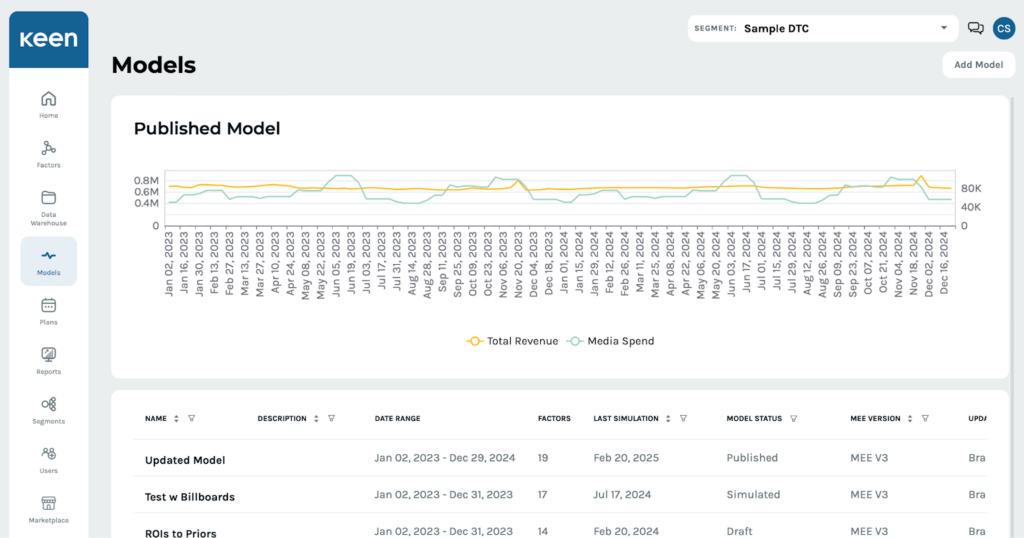Direct to consumer (DTC) marketing is an approach that allows a unique sense of connection and personalization, so successfully leveraging its advantages will undoubtedly create the kind of positive experience that keeps customers coming back.
In a crowded DTC market, the right strategy helps you connect and grow.
Key highlights:
- Personalized experiences build loyalty in a DTC marketing funnel to keep customers coming back.
- Right DTC channels matter so you can reach your target audience effectively.
- Stand out smartly in a crowded DTC space to make a lasting impact.
- Use data wisely to improve your DTC marketing decisions with insights.
- Optimize your DTC marketing strategy for growth so you can focus on what drives results.
Refine your approach to cut through the noise and succeed.
What Is Direct to Consumer (DTC) Marketing?
Direct to consumer (DTC) marketing is when brands sell directly to customers, bypassing traditional retailers for more control and stronger connections.
DTC marketing helps you:
- Build direct customer relationships
- Control your brand experience
- Use data to improve marketing
Evolution of DTC Marketing Strategies
DTC sales have moved from traditional methods to data-driven marketing strategies. A successful marketing strategy for such brands delivers personalized messages across different online and offline DTC channels for better engagement and growth.
This digital evolution gives consumers more control and choice in their purchasing decisions. DTC-only brands are leading this change.
To that end, we’re going to take a look at the evolution of DTC marketing strategies and share actionable insights that you can use to fortify your marketing game plan in this highly competitive sector.
Turning DTC Challenges into Opportunities
Even successful DTC brands face challenges like:
- High customer acquisition costs
- The need to build trust without third-party retailers
- Complex logistics
While scaling can be tough, these challenges also create advantages. With direct access to customer attribution data, DTC consumer brands can:
- Strengthen customer relationships
- Create a strong brand identity
- Refine marketing messaging
- Enhance service
Full control over the brand experience eventually drives loyalty, growth, and long-term success.
Importance of Cross-Channel Optimization for DTC Brands
They say, “variety is the spice of life.” The same applies to your marketing channel mix.
So, for DTC companies, cross-channel optimization is critical. There seems to be no shortage of marketing channels today, from waning traditional media to new standards such as social media, email, websites, and mobile apps.
Cross-channel optimization helps you lead with a unified marketing strategy, creating a seamless brand experience. By aligning messaging, timing, and targeting, brands deliver a personalized, cohesive experience. This boosts customer satisfaction, loyalty, and conversion rates.
How Marketing Mix Modeling (MMM) Drives DTC Success
Marketing mix modeling (MMM) helps DTC brands measure the impact of product, price, promotion, and distribution on sales and customer acquisition.
By analyzing these factors, brands can optimize their marketing mix, allocate resources wisely, and improve efficiency.
With data-driven insights, MMM enables businesses to refine marketing efforts, boost revenue, and drive long-term growth. This gives them a competitive edge in the ever-evolving world of DTC marketing.
Keen’s Approach to Holistic Measurement and Optimization
Due to the increase of new online and offline channels appearing on a regular basis, DTC marketing mix optimization needs to take a holistic measurement approach.
Keen’s AI-powered marketing mix platform provides historical performance measurement, as well as predictive and prescriptive plans to optimize ongoing marketing spend decisions—across all channels including retail media and e-commerce.

Those investment decisions are then connected to financial outcomes.
Our Bayesian modeling approach combines multiple sources into a unified model. Our models are sourced with the following data:
| Historical Measurement | Keen’s Knowledge Estate (Marketing Elasticity Engine) | Prior Brand Studies |
|---|---|---|
| Includes your weekly revenue, activity by channel and platform, marketing investments and external factors such as relative price and distribution. | Includes 40 years of academic models. | Includes tactic coefficients from prior MMX studies, internal analyses and panel data, household penetration data and lift studies. |
| Includes your weekly revenue, activity by channel and platform, marketing investments, and external factors such as relative price and distribution. | Includes 10 years of client metadata and data from recent marketplace dynamics. Data includes industry and category, size of business and lifecycle and margin, geographic location and region and distribution channels (online, offline and both) and many more. | |
| Measures the equity effect of current revenue (long-term ROIs). | Can act as custom priors for your brand which can be influenced through the regression model when your data is loaded in. Data can include clicks, time series spend, impressions, COGS, etc. |

From these three types of data, brands receive a holistic measurement model they can use to accurately plan future investments.
The Impact of MMM on Short-term and Long-term DTC Marketing Goals
It’s easy to see that marketing mix modeling is a powerful analytical technique that can help businesses understand the impact of their marketing efforts on their overall goals. This technique can also explore specific impacts on both short-term and long-term marketing goals. Here’s how:
- Long-term impact of DTC marketing optimization: Each element of the marketing mix plays a role, and the modeling approach moves the levers for each to reveal valuable insights into each element’s effectiveness, as well as their collective contribution to achieving your marketing objectives. MMM guides long-term strategy, strengthening brand equity, customer loyalty, and profitability.
- Short-term impact of DTC marketing optimization: MMM helps businesses optimize campaigns with data-driven insights. It improves ROI by analyzing marketing impact on sales, customer acquisition, and brand awareness.
Expanding Beyond DTC Performance Marketing (Digital Media) with Keen
With a strong focus on metrics like Return on Ad Spend (ROAS), performance marketing has become the norm in the marketing landscape. The problem: relying on a DTC marketing agency or superficial metrics can only take you so far.
DTC in marketing needs to go beyond traditional metrics and choose iROAS, considering non-impression-based media and macro conditions affecting sales. iROAS focuses on incremental returns, offering a more accurate view of marketing performance. Plus, it’ll also give you insights on DTC full-funnel optimization.
Tools like Keen help measure long-term effects of the marketing strategy of DTC advertisers, guiding smarter decisions and driving bottom-line impact.
Data-Driven Decision Making with the Keen Platform
The Keen Platform is designed to become part of the DTC planning process at every stage.
It allows you to see the effect of marketing spend across all channels and how they impact each other. You have the ability to evaluate channel and timing options, and quickly account for how your marketing decisions contribute to or distract from your targeted financial outcomes.
Our models evolve to ensure accurate, relevant data, helping DTC brands make informed investment decisions. Data analytics enables deep personalization, allowing brands to tailor customer experiences like never before.
In addition, data analytics gives businesses deep insight into individual customers. Personalization drives engagement and repeat purchases through tailored recommendations. Data analytics unlocks insights that help businesses create meaningful, lasting customer relationships.
How Keen Can Help Implement Effective DTC Marketing Tactics
The Keen Platform enables marketers to see the potential ROI on investments in new channels before you start testing and presents the optimal plan for hitting your revenue goals.
Additionally, the platform will optimize the interaction effects between online and offline channels and timing impact to drive the most profitable result for your brand.

Maximizing DTC Marketing Mix Efficiency with Keen
Data. People. Insight.
DTC marketing isn’t just about the right tools—it’s about making smart, data-driven decisions. The Keen Platform gives you the insights to optimize channels, maximize ROI, and stay ahead in an ever-evolving landscape. With Keen, you can streamline your strategy and drive sustained growth with confidence.
Want to learn how Keen can help you embrace the power of data and analytics for your DTC marketing optimization? Take a tour of the platform today!





